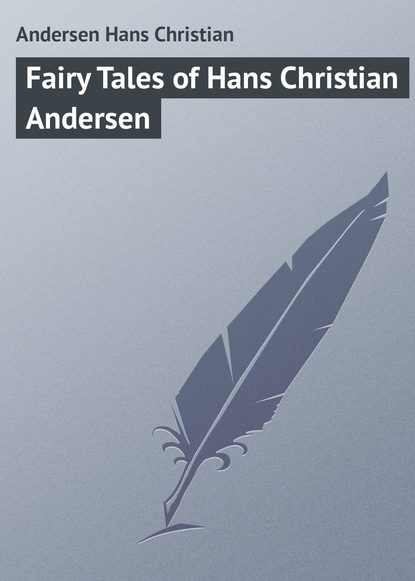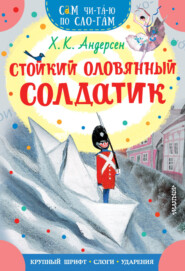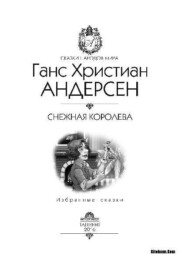По всем вопросам обращайтесь на: info@litportal.ru
(©) 2003-2024.
✖
Fairy Tales of Hans Christian Andersen
Настройки чтения
Размер шрифта
Высота строк
Поля
But the little daughter of the merchant became very angry at this speech, for her father's name was Petersen, and she knew that the name ended in "sen," and therefore she said as proudly as she could, "But my papa can buy a hundred dollars' worth of bonbons, and give them away to children. Can your papa do that?"
"Yes; and my papa," said the little daughter of the editor of a paper, "my papa can put your papa and everybody's papa into the newspaper. All sorts of people are afraid of him, my mamma says, for he can do as he likes with the paper." And the little maiden looked exceedingly proud, as if she had been a real princess, who may be expected to look proud.
But outside the door, which stood ajar, was a poor boy, peeping through the crack of the door. He was of such a lowly station that he had not been allowed even to enter the room. He had been turning the spit for the cook, and she had given him permission to stand behind the door and peep in at the well-dressed children, who were having such a merry time within; and for him that was a great deal. "Oh, if I could be one of them," thought he, and then he heard what was said about names, which was quite enough to make him more unhappy. His parents at home had not even a penny to spare to buy a newspaper, much less could they write in one; and worse than all, his father's name, and of course his own, ended in "sen," and therefore he could never turn out well, which was a very sad thought. But after all, he had been born into the world, and the station of life had been chosen for him, therefore he must be content.
And this is what happened on that evening.
Many years passed, and most of the children became grown-up persons.
There stood a splendid house in the town, filled with all kinds of beautiful and valuable objects. Everybody wished to see it, and people even came in from the country round to be permitted to view the treasures it contained.
Which of the children whose prattle we have described, could call this house his own? One would suppose it very easy to guess. No, no; it is not so very easy. The house belonged to the poor little boy who had stood on that night behind the door. He had really become something great, although his name ended in "sen," – for it was Thorwaldsen.
And the three other children – the children of good birth, of money, and of intellectual pride, – well, they were respected and honored in the world, for they had been well provided for by birth and position, and they had no cause to reproach themselves with what they had thought and spoken on that evening long ago, for, after all, it was mere "children's prattle."
THE FARM-YARD COCK AND THE WEATHER-COCK
There were two cocks – one on the dung-hill, the other on the roof. They were both arrogant, but which of the two rendered most service? Tell us your opinion – we'll keep to ours just the same though.
The poultry yard was divided by some planks from another yard in which there was a dung-hill, and on the dung-hill lay and grew a large cucumber which was conscious of being a hot-bed plant.
"One is born to that," said the cucumber to itself. "Not all can be born cucumbers; there must be other things, too. The hens, the ducks, and all the animals in the next yard are creatures too. Now I have a great opinion of the yard cock on the plank; he is certainly of much more importance than the weather-cock who is placed so high and can't even creak, much less crow. The latter has neither hens nor chicks, and only thinks of himself and perspires verdigris. No, the yard cock is really a cock! His step is a dance! His crowing is music, and wherever he goes one knows what a trumpeter is like! If he would only come in here! Even if he ate me up stump, stalk, and all, and I had to dissolve in his body, it would be a happy death," said the cucumber.
In the night there was a terrible storm. The hens, chicks, and even the cock sought shelter; the wind tore down the planks between the two yards with a crash; the tiles came tumbling down, but the weather-cock sat firm. He did not even turn round, for he could not; and yet he was young and freshly cast, but prudent and sedate. He had been born old, and did not at all resemble the birds flying in the air – the sparrows, and the swallows; no, he despised them, these mean little piping birds, these common whistlers. He admitted that the pigeons, large and white and shining like mother-o'-pearl, looked like a kind of weather-cock; but they were fat and stupid, and all their thoughts and endeavours were directed to filling themselves with food, and besides, they were tiresome things to converse with. The birds of passage had also paid the weather-cock a visit and told him of foreign countries, of airy caravans and robber stories that made one's hair stand on end. All this was new and interesting; that is, for the first time, but afterwards, as the weather-cock found out, they repeated themselves and always told the same stories, and that's very tedious, and there was no one with whom one could associate, for one and all were stale and small-minded.
"The world is no good!" he said. "Everything in it is so stupid."
The weather-cock was puffed up, and that quality would have made him interesting in the eyes of the cucumber if it had known it, but it had eyes only for the yard cock, who was now in the yard with it.
The wind had blown the planks, but the storm was over.
"What do you think of that crowing?" said the yard cock to the hens and chickens. "It was a little rough – it wanted elegance."
And the hens and chickens came up on the dung-hill, and the cock strutted about like a lord.
"Garden plant!" he said to the cucumber, and in that one word his deep learning showed itself, and it forgot that he was pecking at her and eating it up. "A happy death!"
The hens and the chickens came, for where one runs the others run too; they clucked, and chirped, and looked at the cock, and were proud that he was of their kind.
"Cock-a-doodle-doo!" he crowed, "the chickens will grow up into great hens at once, if I cry it out in the poultry-yard of the world!"
And hens and chicks clucked and chirped, and the cock announced a great piece of news.
"A cock can lay an egg! And do you know what's in that egg? A basilisk. No one can stand the sight of such a thing; people know that, and now you know it too – you know what is in me, and what a champion of all cocks I am!"
With that the yard cock flapped his wings, made his comb swell up, and crowed again; and they all shuddered, the hens and the little chicks – but they were very proud that one of their number was such a champion of all cocks. They clucked and chirped till the weather-cock heard; he heard it; but he did not stir.
"Everything is very stupid," the weather-cock said to himself. "The yard cock lays no eggs, and I am too lazy to do so; if I liked, I could lay a wind-egg. But the world is not worth even a wind-egg. Everything is so stupid! I don't want to sit here any longer."
With that the weather-cock broke off; but he did not kill the yard cock, although the hens said that had been his intention. And what is the moral? "Better to crow than to be puffed up and break off!"
THE DAISY
Now listen! In the country, close by the high road, stood a farmhouse; perhaps you have passed by and seen it yourself. There was a little flower garden with painted wooden palings in front of it; close by was a ditch, on its fresh green bank grew a little daisy; the sun shone as warmly and brightly upon it as on the magnificent garden flowers, and therefore it thrived well. One morning it had quite opened, and its little snow-white petals stood round the yellow centre, like the rays of the sun. It did not mind that nobody saw it in the grass, and that it was a poor despised flower; on the contrary, it was quite happy, and turned towards the sun, looking upward and listening to the song of the lark high up in the air.
The little daisy was as happy as if the day had been a great holiday, but it was only Monday. All the children were at school, and while they were sitting on the forms and learning their lessons, it sat on its thin green stalk and learnt from the sun and from its surroundings how kind God is, and it rejoiced that the song of the little lark expressed so sweetly and distinctly its own feelings. With a sort of reverence the daisy looked up to the bird that could fly and sing, but it did not feel envious. "I can see and hear," it thought; "the sun shines upon me, and the forest kisses me. How rich I am!"
In the garden close by grew many large and magnificent flowers, and, strange to say, the less fragrance they had the haughtier and prouder they were. The peonies puffed themselves up in order to be larger than the roses, but size is not everything! The tulips had the finest colours, and they knew it well, too, for they were standing bolt upright like candles, that one might see them the better. In their pride they did not see the little daisy, which looked over to them and thought, "How rich and beautiful they are! I am sure the pretty bird will fly down and call upon them. Thank God, that I stand so near and can at least see all the splendour." And while the daisy was still thinking, the lark came flying down, crying "Tweet," but not to the peonies and tulips – no, into the grass to the poor daisy. Its joy was so great that it did not know what to think. The little bird hopped round it and sang, "How beautifully soft the grass is, and what a lovely little flower with its golden heart and silver dress is growing here." The yellow centre in the daisy did indeed look like gold, while the little petals shone as brightly as silver.
How happy the daisy was! No one has the least idea. The bird kissed it with its beak, sang to it, and then rose again up to the blue sky. It was certainly more than a quarter of an hour before the daisy recovered its senses. Half ashamed, yet glad at heart, it looked over to the other flowers in the garden; surely they had witnessed its pleasure and the honour that had been done to it; they understood its joy. But the tulips stood more stiffly than ever, their faces were pointed and red, because they were vexed. The peonies were sulky; it was well that they could not speak, otherwise they would have given the daisy a good lecture. The little flower could very well see that they were ill at ease, and pitied them sincerely.
Shortly after this a girl came into the garden, with a large sharp knife. She went to the tulips and began cutting them off, one after another. "Ugh!" sighed the daisy, "that is terrible; now they are done for."
The girl carried the tulips away. The daisy was glad that it was outside, and only a small flower – it felt very grateful. At sunset it folded its petals, and fell asleep, and dreamt all night of the sun and the little bird.
On the following morning, when the flower once more stretched forth its tender petals, like little arms, towards the air and light, the daisy recognised the bird's voice, but what it sang sounded so sad. Indeed the poor bird had good reason to be sad, for it had been caught and put into a cage close by the open window. It sang of the happy days when it could merrily fly about, of fresh green corn in the fields, and of the time when it could soar almost up to the clouds. The poor lark was most unhappy as a prisoner in a cage. The little daisy would have liked so much to help it, but what could be done? Indeed, that was very difficult for such a small flower to find out. It entirely forgot how beautiful everything around it was, how warmly the sun was shining, and how splendidly white its own petals were. It could only think of the poor captive bird, for which it could do nothing. Then two little boys came out of the garden; one of them had a large sharp knife, like that with which the girl had cut the tulips. They came straight towards the little daisy, which could not understand what they wanted.
"Here is a fine piece of turf for the lark," said one of the boys, and began to cut out a square round the daisy, so that it remained in the centre of the grass.
"Pluck the flower off," said the other boy, and the daisy trembled for fear, for to be pulled off meant death to it; and it wished so much to live, as it was to go with the square of turf into the poor captive lark's cage.
"No let it stay," said the other boy, "it looks so pretty."
And so it stayed, and was brought into the lark's cage. The poor bird was lamenting its lost liberty, and beating its wings against the wires; and the little daisy could not speak or utter a consoling word, much as it would have liked to do so. So the forenoon passed.
"I have no water," said the captive lark, "they have all gone out, and forgotten to give me anything to drink. My throat is dry and burning. I feel as if I had fire and ice within me, and the air is so oppressive. Alas! I must die, and part with the warm sunshine, the fresh green meadows, and all the beauty that God has created." And it thrust its beak into the piece of grass, to refresh itself a little. Then it noticed the little daisy, and nodded to it, and kissed it with its beak and said: "You must also fade in here, poor little flower. You and the piece of grass are all they have given me in exchange for the whole world, which I enjoyed outside. Each little blade of grass shall be a green tree for me, each of your white petals a fragrant flower. Alas! you only remind me of what I have lost."
"I wish I could console the poor lark," thought the daisy. It could not move one of its leaves, but the fragrance of its delicate petals streamed forth, and was much stronger than such flowers usually have: the bird noticed it, although it was dying with thirst, and in its pain tore up the green blades of grass, but did not touch the flower.
The evening came, and nobody appeared to bring the poor bird a drop of water; it opened its beautiful wings, and fluttered about in its anguish; a faint and mournful "Tweet, tweet," was all it could utter, then it bent its little head towards the flower, and its heart broke for want and longing. The flower could not, as on the previous evening, fold up its petals and sleep; it dropped sorrowfully. The boys only came the next morning; when they saw the dead bird, they began to cry bitterly, dug a nice grave for it, and adorned it with flowers. The bird's body was placed in a pretty red box; they wished to bury it with royal honours. While it was alive and sang they forgot it, and let it suffer want in the cage; now, they cried over it and covered it with flowers. The piece of turf, with the little daisy in it, was thrown out on the dusty highway. Nobody thought of the flower which had felt so much for the bird and had so greatly desired to comfort it.
THE DARNING-NEEDLE
There was once a darning-needle who thought herself so fine that she fancied she must be fit for embroidery. "Hold me tight," she would say to the fingers, when they took her up, "don't let me fall; if you do I shall never be found again, I am so very fine."
"That is your opinion, is it?" said the fingers, as they seized her round the body.
"See, I am coming with a train," said the darning-needle, drawing a long thread after her; but there was no knot in the thread.
The fingers then placed the point of the needle against the cook's slipper. There was a crack in the upper leather, which had to be sewn together.
"What coarse work!" said the darning-needle, "I shall never get through. I shall break! – I am breaking!" and sure enough she broke. "Did I not say so?" said the darning-needle, "I know I am too fine for such work as that."
"This needle is quite useless for sewing now," said the fingers; but they still held it fast, and the cook dropped some sealing-wax on the needle, and fastened her handkerchief with it in front.
"So now I am a breast-pin," said the darning-needle; "I knew very well I should come to honor some day: merit is sure to rise;" and she laughed, quietly to herself, for of course no one ever saw a darning-needle laugh. And there she sat as proudly as if she were in a state coach, and looked all around her. "May I be allowed to ask if you are made of gold?" she inquired of her neighbor, a pin; "you have a very pretty appearance, and a curious head, although you are rather small. You must take pains to grow, for it is not every one who has sealing-wax dropped upon him;" and as she spoke, the darning-needle drew herself up so proudly that she fell out of the handkerchief right into the sink, which the cook was cleaning. "Now I am going on a journey," said the needle, as she floated away with the dirty water, "I do hope I shall not be lost." But she really was lost in a gutter. "I am too fine for this world," said the darning-needle, as she lay in the gutter; "but I know who I am, and that is always some comfort." So the darning-needle kept up her proud behavior, and did not lose her good humor. Then there floated over her all sorts of things, – chips and straws, and pieces of old newspaper. "See how they sail," said the darning-needle; "they do not know what is under them. I am here, and here I shall stick. See, there goes a chip, thinking of nothing in the world but himself – only a chip. There's a straw going by now; how he turns and twists about! Don't be thinking too much of yourself, or you may chance to run against a stone. There swims a piece of newspaper; what is written upon it has been forgotten long ago, and yet it gives itself airs. I sit here patiently and quietly. I know who I am, so I shall not move."
One day something lying close to the darning-needle glittered so splendidly that she thought it was a diamond; yet it was only a piece of broken bottle. The darning-needle spoke to it, because it sparkled, and represented herself as a breast-pin. "I suppose you are really a diamond?" she said.

















